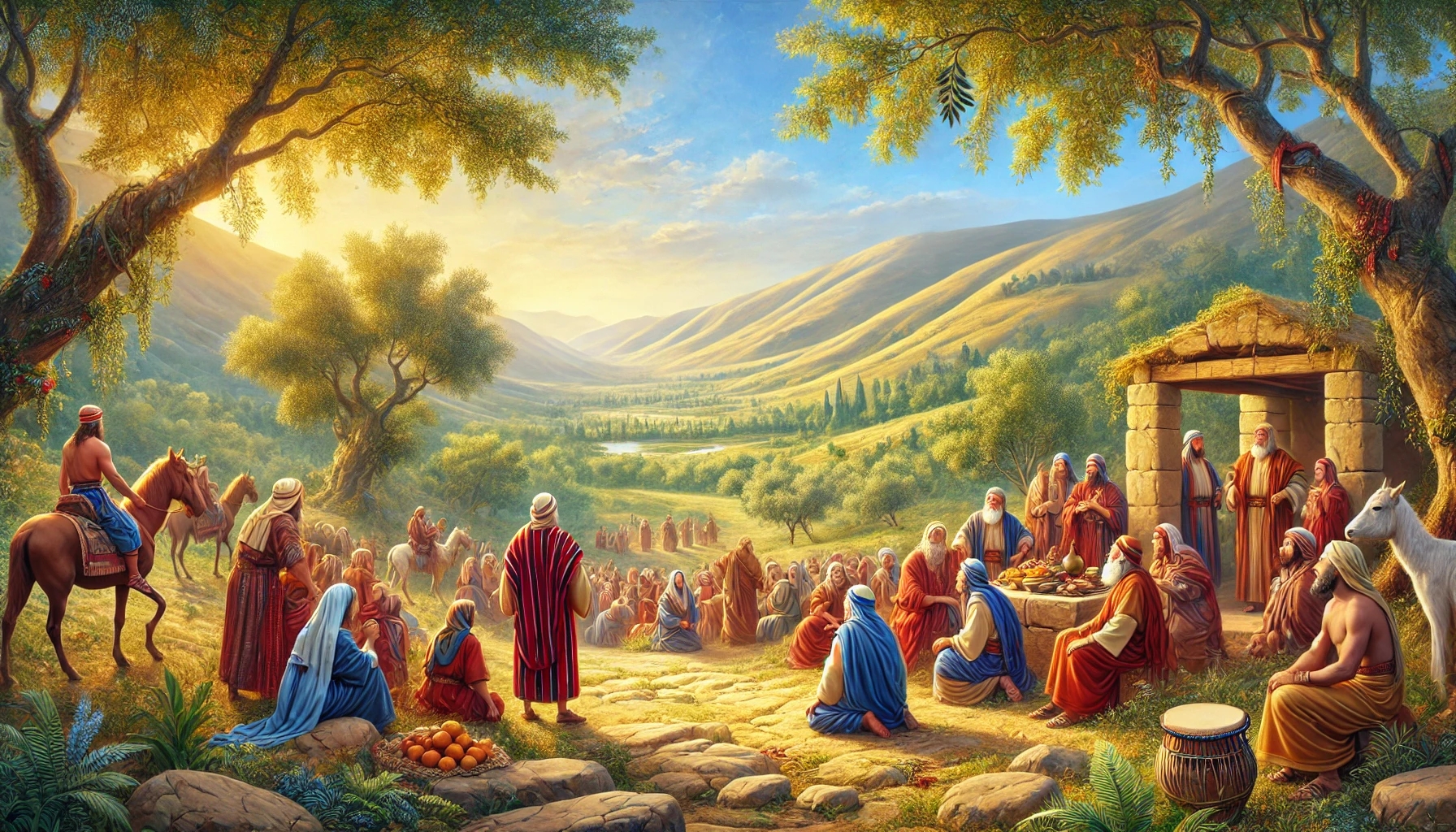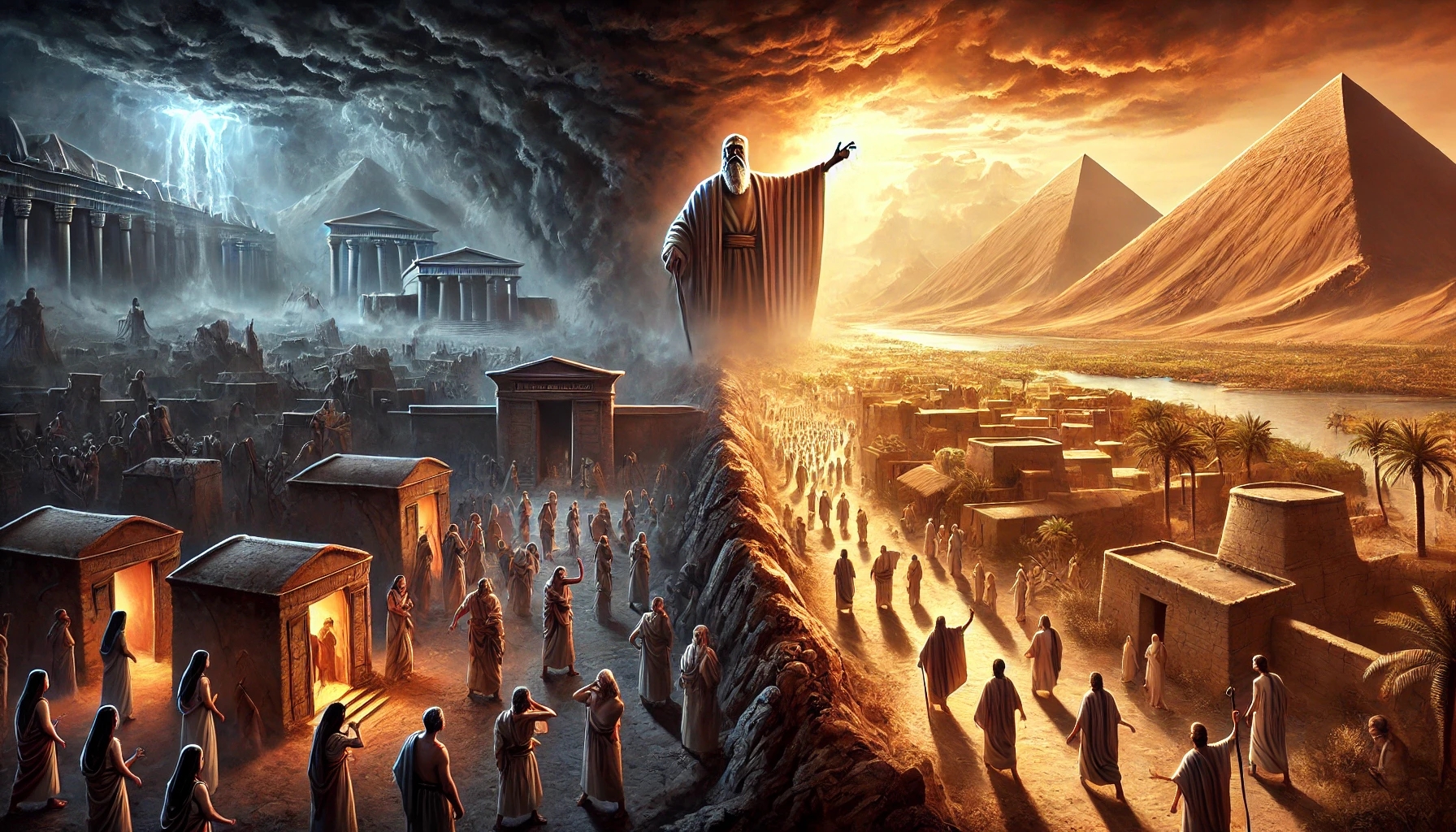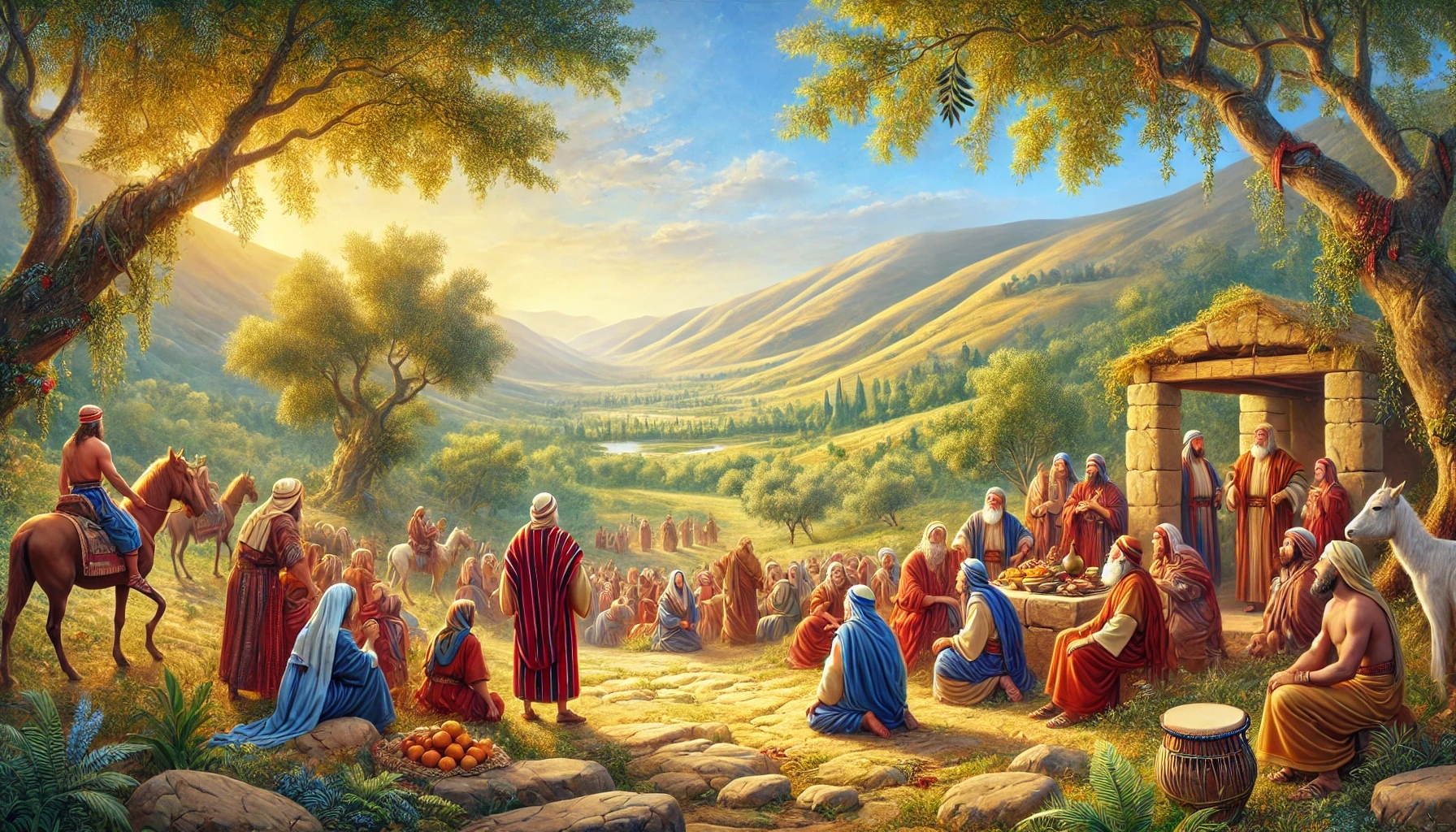 July 25, 2025
July 25, 2025
 DAILY BIBLE READING
DAILY BIBLE READING
 Leviticus 10 – Holiness before the Lord – Nadab and Abihu and the Consequences of Disobedience
Leviticus 10 – Holiness before the Lord – Nadab and Abihu and the Consequences of Disobedience
 God takes true worship seriously – and expects reverence and obedience
God takes true worship seriously – and expects reverence and obedience
══════════════════════════════════════════════
 Bible Text – Leviticus 10 (KJV)
Bible Text – Leviticus 10 (KJV)
1 And Nadab and Abihu, the sons of Aaron, took either of them his censer, and put fire therein, and put incense thereon, and offered strange fire before the Lord, which he commanded them not.
2 And there went out fire from the Lord, and devoured them, and they died before the Lord.
3 Then Moses said unto Aaron, This is it that the Lord spake, saying, I will be sanctified in them that come nigh me, and before all the people I will be glorified. And Aaron held his peace.
4 And Moses called Mishael and Elzaphan, the sons of Uzziel the uncle of Aaron, and said unto them, Come near, carry your brethren from before the sanctuary out of the camp.
5 So they went near, and carried them in their coats out of the camp; as Moses had said.
6 And Moses said unto Aaron, and unto Eleazar and unto Ithamar, his sons, Uncover not your heads, neither rend your clothes; lest ye die, and lest wrath come upon all the people: but let your brethren, the whole house of Israel, bewail the burning which the Lord hath kindled.
7 And ye shall not go out from the door of the tabernacle of the congregation, lest ye die: for the anointing oil of the Lord is upon you. And they did according to the word of Moses.
8 And the Lord spake unto Aaron, saying,
9 Do not drink wine nor strong drink, thou, nor thy sons with thee, when ye go into the tabernacle of the congregation, lest ye die: it shall be a statute for ever throughout your generations:
10 And that ye may put difference between holy and unholy, and between unclean and clean;
11 And that ye may teach the children of Israel all the statutes which the Lord hath spoken unto them by the hand of Moses.
12 And Moses spake unto Aaron, and unto Eleazar and unto Ithamar, his sons that were left, Take the meat offering that remaineth of the offerings of the Lord made by fire, and eat it without leaven beside the altar: for it is most holy:
13 And ye shall eat it in the holy place, because it is thy due, and thy sons’ due, of the sacrifices of the Lord made by fire: for so I am commanded.
14 And the wave breast and heave shoulder shall ye eat in a clean place; thou, and thy sons, and thy daughters with thee: for they be thy due, and thy sons’ due, which are given out of the sacrifices of peace offerings of the children of Israel.
15 The heave shoulder and the wave breast shall they bring with the offerings made by fire of the fat, to wave it for a wave offering before the Lord; and it shall be thine, and thy sons’ with thee, by a statute for ever; as the Lord hath commanded.
16 And Moses diligently sought the goat of the sin offering, and, behold, it was burnt: and he was angry with Eleazar and Ithamar, the sons of Aaron which were left alive, saying,
17 Wherefore have ye not eaten the sin offering in the holy place, seeing it is most holy, and God hath given it you to bear the iniquity of the congregation, to make atonement for them before the Lord?
18 Behold, the blood of it was not brought in within the holy place: ye should indeed have eaten it in the holy place, as I commanded.
19 And Aaron said unto Moses, Behold, this day have they offered their sin offering and their burnt offering before the Lord; and such things have befallen me: and if I had eaten the sin offering to day, should it have been accepted in the sight of the Lord?
20 And when Moses heard that, he was content.
══════════════════════════════════════════════
 Introduction
Introduction
The shock is great: Two newly appointed priests, Nadab and Abihu – sons of Aaron – die immediately before the sanctuary because they offered “unauthorized fire.”
What may seem like a small error to man was a serious breach of God’s holy order.
This chapter shows how crucial reverence, obedience, and spiritual sobriety are in God’s service – and that holiness is non-negotiable.
══════════════════════════════════════════════
 Commentary
Commentary
1. The serious incident (vv. 1–2)
Nadab and Abihu act on their own. They bring “strange fire” – in other words, they act against God’s clear instruction.
→ Self-invented worship contradicts God’s holiness.
2. God’s reaction: Holiness demands consequence (vv. 2–3)
God does not respond with mild correction but with fire – the same element with which He normally accepts offerings. Here, fire becomes judgment.
→ God is holy and does not accept false zeal.
3. Aaron’s silence (v. 3)
Moses explains that God shows Himself holy to those who are near Him. Aaron, the father, remains silent. No protest. No complaint. Just stillness.
→ Reverence for God’s justice may express itself in silence.
4. Spiritual sobriety is required (vv. 8–11)
God tells Aaron that priests must not drink wine or strong drink when serving. There may have been a link between Nadab and Abihu’s failure and a lack of sobriety.
→ Serving God requires clarity, vigilance, and discipline.
5. Correct handling of the offerings – priestly responsibility (vv. 12–20)
Priests had to strictly follow God’s instructions – even in offerings. Moses was angry when they deviated, but Aaron explained himself sincerely – and Moses accepted it.
→ God sees not only the act but the heart – yet carelessness in service remains dangerous.
══════════════════════════════════════════════
 Summary
Summary
-
Nadab and Abihu died because they served God their own way.
-
God’s holiness is non-negotiable – obedience is essential.
-
Priests (today: leaders and believers) are called to act with reverence and sobriety.
-
God desires purity, clarity, and alignment with His will – not improvisation.
══════════════════════════════════════════════
 Message for Us Today
Message for Us Today
God is not a follower of our religious enthusiasm.
He expects worship in “spirit and truth” (John 4:24) – not based on feelings or preferences.
This chapter calls us to spiritual discipline, reverent closeness, and service that follows His order – not our own.
We live under grace – but God’s holiness remains unchanged.
Whoever draws near to Him must also be shaped by Him.
══════════════════════════════════════════════
 Reflection Questions
Reflection Questions
– How seriously do I take God’s presence?
– Do I serve from conviction and clarity – or from habit?
– Am I willing to be led daily by the Spirit – even in structure?
– Do I confuse creativity with obedience – or do I follow God’s standard on purpose?
~~~~~  ~~~~~
~~~~~
 July 20 – 26, 2025
July 20 – 26, 2025
 WEEKLY SPIRIT OF PROPHECY READING
WEEKLY SPIRIT OF PROPHECY READING
 Ellen G. White │ Patriarchs and Prophets – Chapter 18
Ellen G. White │ Patriarchs and Prophets – Chapter 18
 The Night of Wrestling
The Night of Wrestling
 Read online here
Read online here
══════════════════════════════════════════════
 Introduction
Introduction
The story of Jacob is a story of hope for everyone who has ever wrestled with guilt, fear, or doubt. Jacob, who once gained the birthright through deceit, returns after years of exile—marked, repentant, but changed. Before him lies a confrontation with his brother Esau—a man who would have every reason to seek revenge.
On the night at the river Jabbok, the decisive turning point comes. There, Jacob wrestles—not just with an angel, but with his past, his guilt, and his God.
══════════════════════════════════════════════
 Commentary
Commentary
 1. Jacob’s Return: Between Promise and Fear
1. Jacob’s Return: Between Promise and Fear
Jacob follows God’s call back to the Promised Land, but fear of Esau paralyzes him. Despite divine promises, he wrestles inwardly with the guilt of his past.
“Then Jacob was greatly afraid and distressed.” – Genesis 32:7
He does everything humanly possible: sends messengers, prepares gifts, divides his flock. But he knows: it’s not enough. He needs God’s intervention.
 2. The Night at Jabbok – Wrestling with God
2. The Night at Jabbok – Wrestling with God
In solitude, Jacob does not flee—he prays. He longs to meet God. Then a mysterious opponent appears—an all-night struggle begins.
No words, just physical wrestling.
But soon it becomes clear: this is more than a man—it is a heavenly being—the Angel of the Covenant, Christ Himself (cf. Malachi 3:1).
Jacob holds on—despite the wound to his hip—and clings to the angel, not asking for power, but for blessing.
“I will not let you go unless you bless me.” – Genesis 32:26
What began as a physical struggle becomes a spiritual victory: Jacob confesses his guilt, pleads for grace, and receives a new name—Israel.
 3. The Morning After – From Fear to Reconciliation
3. The Morning After – From Fear to Reconciliation
Jacob meets Esau—not as a deceiver, but as one marked by God. He limps, but his face shines. And Esau? Instead of anger, he shows grace.
“But Esau ran to meet him and embraced him and fell on his neck and kissed him, and they wept.” – Genesis 33:4
God’s grace touched two hearts: Jacob’s—and Esau’s.
 4. A Prophetic Image – Jacob’s Time of Trouble
4. A Prophetic Image – Jacob’s Time of Trouble
Ellen White interprets Jacob’s night of wrestling as a foreshadowing of the end time:
God’s people will go through a time of trouble (cf. Jeremiah 30:5–7).
Satan will accuse them, pressing them down with guilt.
But like Jacob, they will cling to God’s promises—despite fear, despite weakness—and God’s grace will carry them.
“Those who, like Jacob, hold fast to God’s promises, will find them fulfilled.” – Patriarchs and Prophets
══════════════════════════════════════════════
 Summary
Summary
Jacob wrestles with God—and is blessed.
From deceiver to overcomer: Israel—“he who struggles with God and prevails.”
God’s grace overcomes guilt—not to separate, but to reconcile.
Jacob’s story is also our story: fear, struggle, forgiveness, and new identity in Christ.
══════════════════════════════════════════════
 Message for Us Today
Message for Us Today
Is there something that separates you from God? Jacob shows: genuine repentance is heard.
In the troubles of your life: don’t rely on people, but on God’s promises.
The faith that wrestles through will not be disappointed.
God blesses not the strongest—but those who hold on to Him.
══════════════════════════════════════════════
 Reflection Question
Reflection Question
What are you wrestling with today? Fear, guilt, doubt?
Are you willing not to let go of God—even if you are wounded?
What promise holds you when everything else falls apart?
“I will not let you go unless you bless me.” – Let these words be your prayer today.
~~~~~  ~~~~~
~~~~~
 July 20 – 26, 2025
July 20 – 26, 2025
 WEEKLY SPIRIT OF PROPHECY READING
WEEKLY SPIRIT OF PROPHECY READING
 Ellen G. White │ Patriarchs and Prophets – Chapter 19
Ellen G. White │ Patriarchs and Prophets – Chapter 19
 The Return to Canaan
The Return to Canaan
 Read online here
Read online here
══════════════════════════════════════════════
 Introduction
Introduction
Jacob’s return to Canaan is marked by fulfilled promises, inner renewal—but also by the tragic failures of his sons. The matured patriarch experiences both God’s grace and the consequences of past mistakes within his family. In this chapter of his life, we learn how closely divine blessing is tied to personal responsibility.
══════════════════════════════════════════════
 Commentary
Commentary
 1. Gratitude and Worship in Shechem
1. Gratitude and Worship in Shechem
Jacob arrives “safely” in Shechem—a testimony that God has kept His promise. He buys land, builds an altar, and publicly confesses: “God is the God of Israel.” His faith is seen in daily life through worship, sacrifice, and gratitude.
 2. Dinah’s Tragedy and the Massacre at Shechem (Genesis 34)
2. Dinah’s Tragedy and the Massacre at Shechem (Genesis 34)
The incident with Dinah reveals how dangerous it is to open oneself to the influence of a godless culture. The brutal revenge carried out by Simeon and Levi brings shame upon the family. Jacob perceives the moral decline of his sons and is deeply shaken. This episode marks a dramatic setback on their spiritual journey.
 3. Purification and Return to Bethel
3. Purification and Return to Bethel
God calls Jacob back to the place of promise. But before reaching Bethel, Jacob leads a spiritual reformation in the camp. Idols and foreign jewelry are buried—a symbol of renewed consecration. In Bethel, God appears to him again and renews the covenant.
 4. Tragedies Along the Way: The Deaths of Deborah and Rachel
4. Tragedies Along the Way: The Deaths of Deborah and Rachel
The final stages are marked by loss. Rachel dies during Benjamin’s birth—a profound sorrow for Jacob. Her love had shaped his life. The death of Rebekah’s nurse, Deborah, stirs up old memories. At the same time, God calls Jacob again to faithfulness.
 5. Return to Hebron – Reconciliation with Esau
5. Return to Hebron – Reconciliation with Esau
Jacob meets Isaac again and cares for him in his final years. A peaceful reunion also occurs with Esau. However, the brothers live separately, as their life paths have grown too different.
 6. The Legacy of Parenting: Joseph and His Brothers (Genesis 37)
6. The Legacy of Parenting: Joseph and His Brothers (Genesis 37)
The effects of jealousy, favoritism, and a polygamous family structure are now painfully visible. Joseph is the child of hope—sensitive, God-fearing—but also the target of his brothers’ hatred. His sale into Egypt becomes the next phase of God’s redemptive plan.
══════════════════════════════════════════════
 Summary
Summary
Jacob returns under God’s protection to the Promised Land. He experiences God’s faithfulness but also faces family conflicts, sin, and painful losses. His sons reveal deep character flaws—especially in their betrayal of Joseph. Yet amid the chaos, God’s plan begins to unfold through Joseph, whom He will save and elevate.
══════════════════════════════════════════════
 Message for Us Today
Message for Us Today
God’s promises are fulfilled—even when our path leads through guilt and suffering.
Families need spiritual leadership and purity—compromise comes at a high cost.
Repentance, cleansing, and returning to God bring a new beginning.
Our choices affect generations—for blessing or pain.
What people intend for evil, God can still turn to good.
══════════════════════════════════════════════
 Reflection Question
Reflection Question
Are there “foreign gods” in your life—things that crowd out your devotion to God?
Where is God calling you back to a “Bethel moment” of renewal?
Is your home a place where God is worshipped—daily, visibly, together?
Are you letting God shape you—even through your past mistakes?
“God never turns away anyone who returns to Him in sincere repentance.”
Source: https://fulfilleddesire.net/25-07-2025-leviticus-chapter-10-believe-his-prophets/


 July 25, 2025
July 25, 2025 Growing in Faith
Growing in Faith From Renewal to Blossoming in Christ
From Renewal to Blossoming in Christ ────────────────
──────────────── Bible Text
Bible Text Introduction
Introduction Devotional
Devotional Story – The Boy and the Mountain Path
Story – The Boy and the Mountain Path What Do We Learn from This Story?
What Do We Learn from This Story? Faith as a Guide
Faith as a Guide Reflection – What Does This Mean for You?
Reflection – What Does This Mean for You? Stagnation or Growth?
Stagnation or Growth? Action Steps for Today
Action Steps for Today Pearl Meditation
Pearl Meditation Growth Check
Growth Check Service Today
Service Today Prayer
Prayer Today’s Takeaway
Today’s Takeaway Lesson 4: The Plagues
Lesson 4: The Plagues 4.5 Hail, Locusts, and Darkness
4.5 Hail, Locusts, and Darkness God’s Power Breaks Through All Darkness
God’s Power Breaks Through All Darkness Introduction
Introduction Bible Study
Bible Study


 Question 1: Read Exodus 9:13–10:29. How successful were the plagues in leading Pharaoh to change his mind?
Question 1: Read Exodus 9:13–10:29. How successful were the plagues in leading Pharaoh to change his mind? Application for Daily Life
Application for Daily Life Conclusion
Conclusion Thought of the Day
Thought of the Day Illustration – “The Days of Decision” (Fictional Story)
Illustration – “The Days of Decision” (Fictional Story) July 24, 2025
July 24, 2025 DAILY BIBLE READING
DAILY BIBLE READING Leviticus 9 – God Answers with Fire
Leviticus 9 – God Answers with Fire What it means to encounter God in obedience – the first sacrifice of Aaron and the visible glory of the Lord
What it means to encounter God in obedience – the first sacrifice of Aaron and the visible glory of the Lord Bible Text – Leviticus 8 (KJV)
Bible Text – Leviticus 8 (KJV) Introduction
Introduction Commentary
Commentary Summary
Summary Message for Us Today
Message for Us Today Reflection Questions
Reflection Questions
 July 20 – 26, 2025
July 20 – 26, 2025 1. Jacob’s Return: Between Promise and Fear
1. Jacob’s Return: Between Promise and Fear Reflection Question
Reflection Question
 July 24, 2025
July 24, 2025 Don’t Speak Harsh and Hasty Words
Don’t Speak Harsh and Hasty Words How Our Words Reflect Our Character and Influence for God
How Our Words Reflect Our Character and Influence for God ────────────────
──────────────── Bible Text
Bible Text Introduction
Introduction Devotional
Devotional Story – The Power of a Sentence
Story – The Power of a Sentence What Can We Learn from This Story?
What Can We Learn from This Story? Words stay.
Words stay. Reflection – What Does This Mean for You?
Reflection – What Does This Mean for You? Practical Steps for Today
Practical Steps for Today Let your speech be cleansed – from sarcasm, envy, and gossip.
Let your speech be cleansed – from sarcasm, envy, and gossip. Stop yourself before saying something sharp.
Stop yourself before saying something sharp. Encourage someone today whom others often overlook.
Encourage someone today whom others often overlook. Speak a sentence that uplifts – not one that tears down.
Speak a sentence that uplifts – not one that tears down. Prayer
Prayer Today’s Takeaway
Today’s Takeaway